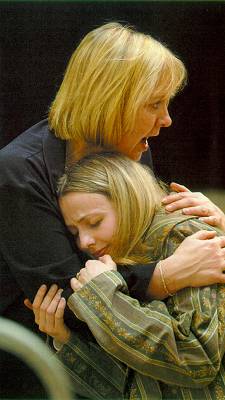|
<< -- 4 -- Rex Harley ORATORIO TO OPERA

This is the moment when one realises that, all along, Mitchell has been subtly emphasising the viewpoint of the women. Anything Jephtha suffers, he has brought on himself. His wife and daughter, however, are the helpless victims of his assumption that he has the right of life and death over his own citizens. Theirs is the real tragedy. They have no rights of their own; no control over their destiny or personal happiness. Their role is to be dutiful. At the end we see mother and daughter, still in shock, staggering along an upstairs corridor and out of view, while the chorus sings: 'So are they blest who fear the Lord. Hallelujah. Amen.'

Susan Bickley (Storgè) and Sarah Tynan (Iphis) in rehearsal. Photo © Brian Tarr
|
This is a powerful production. I am told that, even at the dress rehearsal, 'You could hear a pin drop.' Yet it will have its detractors. I understand why. And, if I were one of them, there is a particular moment to which I would point which simply does not work. It is the crucial moment when Iphis descends the staircase to greet her father; for the fact is, mundane and literalist though this may sound, that Jephtha has already met and been greeted by virtually every other person in the cast before he claps eyes on his daughter. The biblical text, and that of the oratorio echoes it when Jephtha makes his vow, is that the sacrifice shall be 'what, or whoe'er shall salute mine eyes', in other words, 'the first living thing I see'; not 'the first person who comes down the staircase after I've met everyone else and sings to me.'
Continue >>
Copyright © 25 May 2003
Rex Harley, Cardiff, UK

|

